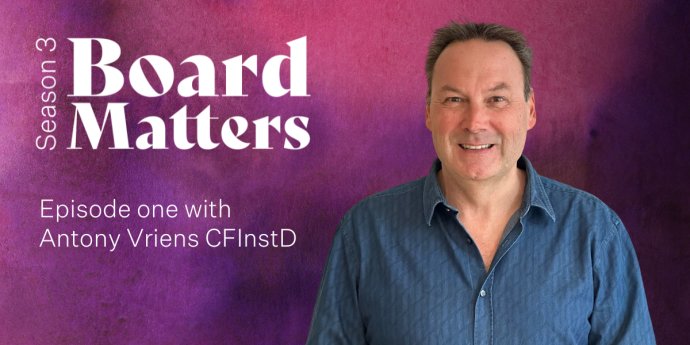Signals ignored: the UK Post Office scandal and the cost of governance silence
A recent webinar on the UK Post Office scandal highlights what boards must do to challenge culture, data and direction.

Trust and creating a safe space go hand-in-hand, according to Tāmaki Makaurau Auckland-based director Antony Vriens CFInstD, who has spent 16 years in governance across NZX-listed boards, private family companies and for-purpose organisations Vriens’ current board roles include Turner's Automotive Group, ME Today Ltd, Gut Cancer Foundation and Asthma NZ.
The former medical doctor has been committed to health outcomes for Aotearoa New Zealand and has held senior roles in insurance and finance across Asia Pacific, bringing a unique lens to his governance roles.
“If you don't have trust, your board is not operating well,” says Vriens, who speaks to Steven Moe MInstD in the first podcast episode of the new season of Board Matters.
“So, if trust is lacking, the right conversations aren't occurring, colleagues won't speak up, the information flow may actually be overtly or subtly channelled, and decisions are made outside the boardroom – and not with full information.”
Vriens says there will also be conflict, mistrust, and a misalignment of interests and “risk will also increase in an environment where it is already heightened”.
“It's a board that's probably not stable or functioning, and then you get all the downstream effects that are created as a consequence – marginalised directors, poor debate on key issues, and turnover of people.”
According to Vriens, C-suite and board dynamics will be impaired, resulting in potentially confrontational behaviour including a lack of trust that the information you have been provided with is “the right information to make decisions”.
But whose role is it to create a safe space to enable the board to operate effectively?
Vriens says it rests on leadership beyond the boardroom.
“It’s a leadership dynamic at all levels of an organisation and the principles and intent are the same wherever – and whenever – we expect people to operate together,” he says.
Board members need to be empowered to contribute. If a safe space has been established, it will allow people to ask questions that might feel obvious, or that could be perceived as contrary.
“For me, trust is actually knowing that your interests are aligned at the board table,” he says.
Steven Moe says this season of Board Matters explores a topic that lends itself to vulnerability from the guests.
“I really enjoyed hearing their stories as we can learn a lot from each other. One person shared how they had been challenged at a board meeting about how they had influenced the discussion.”
Moe says as a direct result, he came away from the podcast interview thinking about how he chairs meetings, and the importance of ensuring everyone has the opportunity to contribute equally.
Moe speaks to different directors over five episodes and says he has already taken away some pearls of wisdom: “While we strive for efficiency, every meeting should start with a check-in rather than jumping straight to agenda item one, because listening to each other from the start will help build whanaungatanga – relationships,” he says.
Season 3 of Board Matters addresses the importance of creating safe spaces in the boardroom.
Listen to the first episode of season 3 below or through your favourite podcast app, including: Spotify | Apple | iHeartRadio